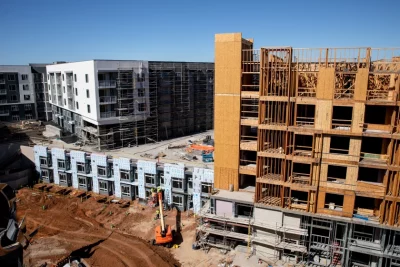Positive Signs That California’s New Housing Laws Will be Enforced
Recent Actions by California Courts & State Officials Are Encouraging, & Push Back Against Local Government Recalcitrance on the Housing Reform Front

In a recent post, I analyzed the California Legislature’s recent passage and Governor Gavin Newsom’s signing into law of two important bills–SB 9 and SB 10–designed to confront California’s well-documented housing crisis. Those laws represent but the latest chapter in the Legislature’s record-setting enactment of numerous statutes in recent years to incentivize and mandate construction of new low and moderate income housing in California. Those state measures have been stoutly resisted by many cities and counties, along with NIMBY groups across the state. (To be fair, some local governments in California–the City of Sacramento, for example–have actively supported and complied with the new state housing reform laws.)
SB 9 and SB 10 take effect on January 1st. Already, lawsuits have been filed by opponents of these laws, claiming that they violate California local governments’ traditional “home rule” authority over land use decisions in the Golden State. Meanwhile, housing advocates are concerned that many cities and counties will continue their rear-guard resistance to a separate, longstanding state mandate that cities and counties approve more housing units, thereby meeting their “fair share” of regional housing needs.
Those concerns are well founded. It’s axiomatic that laws are only aspirational unless and until they’re enforced.
Fortunately, recent action by both California courts and top state officials reflect a strong commitment to enforcing housing reform laws passed by the California Legislature. Enforcement, in turn, is a critically important component of any successful effort to confront and address California’s housing crisis.
First, California courts have recently and repeatedly signaled their willingness to enforce state housing mandates over the objections and dilatory actions of various cities and counties who challenge those mandates. In an important decision by the California Court of Appeal in San Francisco, that court rejected the City of San Mateo’s argument that California’s Housing Accountability Act (HAA) is unconstitutional because it violates local governments’ traditional control over land use and housing decisions. Nonsense, said the justices. They noted that California’s housing crisis is unquestionably a matter of statewide concern, and that the Legislature is fully within its constitutional authority in requiring cities and counties to take meaningful steps to resolve that crisis. The Court of Appeal was aided in its decision by California’s Attorney General, who intervened in the litigation to successfully defend the constitutionality of the HAA. (The court also cited “helpful” friend-of-the-court briefs arguing for vigorous implementation of the HAA, including one filed by a coalition of California law professors including my U.C. Davis School of Law faculty colleagues Chris Elmendorf and Darien Shanske.)
And in another 2021 Court of Appeal decision, the court spurned a similar “home rule” constitutional challenge the City of Berkeley its allies brought against the HAA and other recently-enacted state housing reform laws. The justices identified the numerous recent statutes “the Legislature has adopted to address the crisis of insufficient housing in the state,” focusing on “affordable housing in particular.” The Court of Appeal soundly rejected the constitutional challenge, finding that the City of Berkeley is obliged to follow and implement state housing reform laws.
These decisions should put to rest meritless claims by California local governments and NIMBY groups that they can ignore or circumvent the mandates of the HAA, SB 9 and SB 10 in the future.
The other key development in securing vigorous enforcement of SB 9, SB 10, the HAA and related California housing reform laws comes from the executive branch of state government. Both California Governor Gavin Newsom and Attorney General Rob Bonta have signaled their strong commitment to that goal.
One of the first actions taken by Governor Newsom upon taking office in 2019 was to bring a housing enforcement lawsuit against the City of Huntington Beach. In that litigation, the Governor alleged that Huntington Beach had failed to accommodate its fair share of regional housing needs, as required by state law. Newsom noted that Huntington Beach is the largest of 47 California cities and counties that he declared are violating this state mandate. His lawsuit represented a clear–and welcome–“shot across the bow” of local governments that refuse to comply with state housing laws.
Additionally, the Governor has provided the state Department of Housing and Community Development (HCD)–previously a small and sleepy state agency–with additional funding and staffing to serve as the Newsom Administration’s primary enforcer of state housing laws in the face of local government recalcitrance. HCD’s early actions on this front have been encouraging.
Meanwhile, California Attorney General Rob Bonta recently announced that he is creating a new housing enforcement legal team within the California Department of Justice. Bonta has directed his new unit to coordinate with HCD to enforce state housing mandates in court, but the Attorney General and his staff will have the authority to do so independently as well.
The willingness of Governor Newsom, Attorney General Bonta and HCD to enforce California’s new and improved housing laws is a most welcome development.
To be sure, the Governor and Legislature have more work to do to ensure that 40 million Californians have access to adequate housing. For example, U.C. Davis Law School Professor Chris Elmendorf has argued in a recent San Francisco Chronicle op-ed that the state’s iconic California Environmental Quality Act needs to be revised to better harmonize with California’s housing reform laws.
But the above-described, recent actions of all three branches of California state government to vigorously interpret and enforce SB 9, SB 10, the HAA and California’s other housing reform laws bode well for their successful implementation in 2022 and beyond. That’s a most welcome note on which to ring in the New Year.
Reader Comments
2 Replies to “Positive Signs That California’s New Housing Laws Will be Enforced”
Comments are closed.





What the new statewide zoning does not address are the fiscal and environmental costs of the increased density. Present single family neighborhoods that have adequate water, waste water, school seats, parks will now face rising property taxes and fees to pay for the additional services. Those whose wages have not kept up and those who are on fixed incomes will be forced out of their homes. There is also a multitude of articles reporting the dominant role being played by REITs and speculators in buying properties for rentals contributing to the rising cost of housing. These new laws work well for them, not so much for the individual home buyer.
I agree. The law will most likely also result in escalating prices for all housing in neighborhoods currently zoned for single housing because duplexes and other up-scale multi-family units will inundate these neighborhoods, bringing in more folks who can afford these units. This will drive upwards the cost of all housing, while causing congestion and more air and noise pollution. Be careful of what you ask for! LA and SF serve as great examples of the law of unintended consequences and other old aphorism that the road to hell is paved with good intentions.